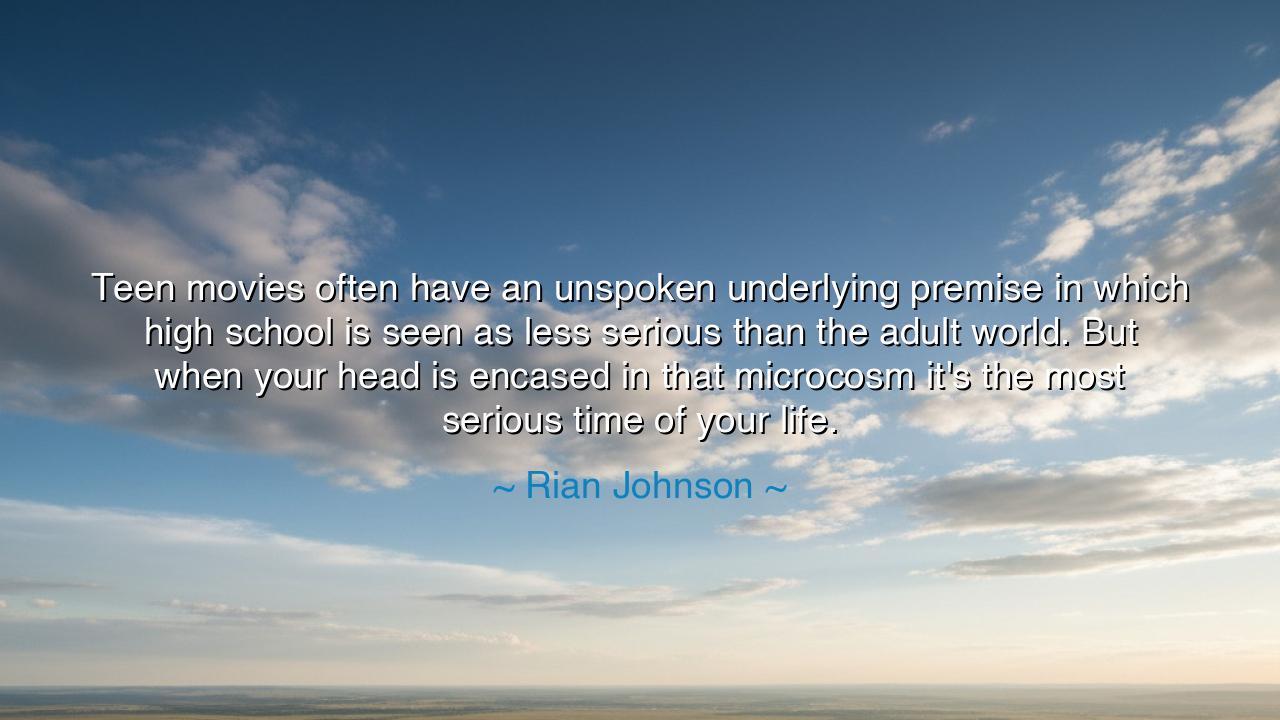
Teen movies often have an unspoken underlying premise in which
Teen movies often have an unspoken underlying premise in which high school is seen as less serious than the adult world. But when your head is encased in that microcosm it's the most serious time of your life.






When Rian Johnson declared, “Teen movies often have an unspoken underlying premise in which high school is seen as less serious than the adult world. But when your head is encased in that microcosm it's the most serious time of your life,” he spoke to a truth both ancient and enduring: that the struggles of youth, though dismissed by elders, are no less real than the trials of maturity. For the one who lives them, the corridors of high school are not trivial stages but battlegrounds where identity, belonging, and hope are forged.
The origin of this insight lies in Johnson’s experience as a storyteller. Known for shaping narratives that challenge convention, he recognized that the way society portrays high school often belittles the genuine intensity of the teen experience. To the adult eye, such struggles seem fleeting—romances, friendships, rivalries, and ambitions that fade with time. Yet to the teen immersed in that world, those conflicts are not small; they are absolute, filling the horizon like mountains. This is the paradox of perspective: what seems minor when looking back is monumental when lived in the present.
History gives us countless reminders that what is dismissed by the powerful often shapes destiny. Consider Joan of Arc, who as a teenager was seen by many as a mere peasant girl. Yet her visions and her faith moved nations and altered the course of France. To her elders, her youthful convictions might have seemed naïve or unserious. Yet in her heart, the weight of her calling was the most serious matter of her life. In the same way, every youth carries battles within the halls of their own microcosm, battles invisible to the world but monumental to the soul.
The microcosm of high school, as Johnson calls it, is not simply a place of learning—it is a miniature society, with its hierarchies, its triumphs, its exiles, and its laws. For the teenager, being accepted or rejected, finding a voice or being silenced, succeeding or failing—these are not abstractions but defining moments. And though adults may laugh at the intensity of such dramas, they forget that their own paths were once shaped by the same crucible. The seriousness lies not in the subject matter, but in the weight it carries for the heart at that age.
The deeper wisdom here is that every stage of life is serious to the one who lives it. The child’s sorrow, though small to an elder, fills the child’s entire sky. The youth’s heartbreak, though fleeting in the eyes of experience, cuts as deep as any wound. And the adult’s burdens, though larger in scale, are built upon the foundations laid in those earlier years. To mock the seriousness of youth is to deny the sacredness of growth, for without those trials, the adult self would never be born.
The lesson for us is clear: respect the struggles of the young, even when they seem trivial to your seasoned eyes. Remember your own past, when your world was enclosed by the walls of school, when a single friendship or betrayal meant everything. Honor that intensity, for it is the fire that forges resilience and wisdom. To dismiss it is to dishonor the very process that made you who you are.
Practical counsel flows: if you are young, know that your struggles are real and worthy, even if others cannot see their gravity. Face them with courage, and do not let anyone diminish the seriousness of your world. If you are older, speak to the young not with condescension but with empathy; guide them not by belittling their pain, but by walking beside them in it.
Thus let Rian Johnson’s words echo as a teaching: what seems light to the elder is weighty to the youth, and every age has its own gravity. Honor the seriousness of each stage, for life itself is not measured by scale, but by the depth of the soul that lives it. In the microcosm of high school, in the palace of adulthood, and in the twilight of age, each moment is the most serious time of life—for it is the only time we are given.






AAdministratorAdministrator
Welcome, honored guests. Please leave a comment, we will respond soon